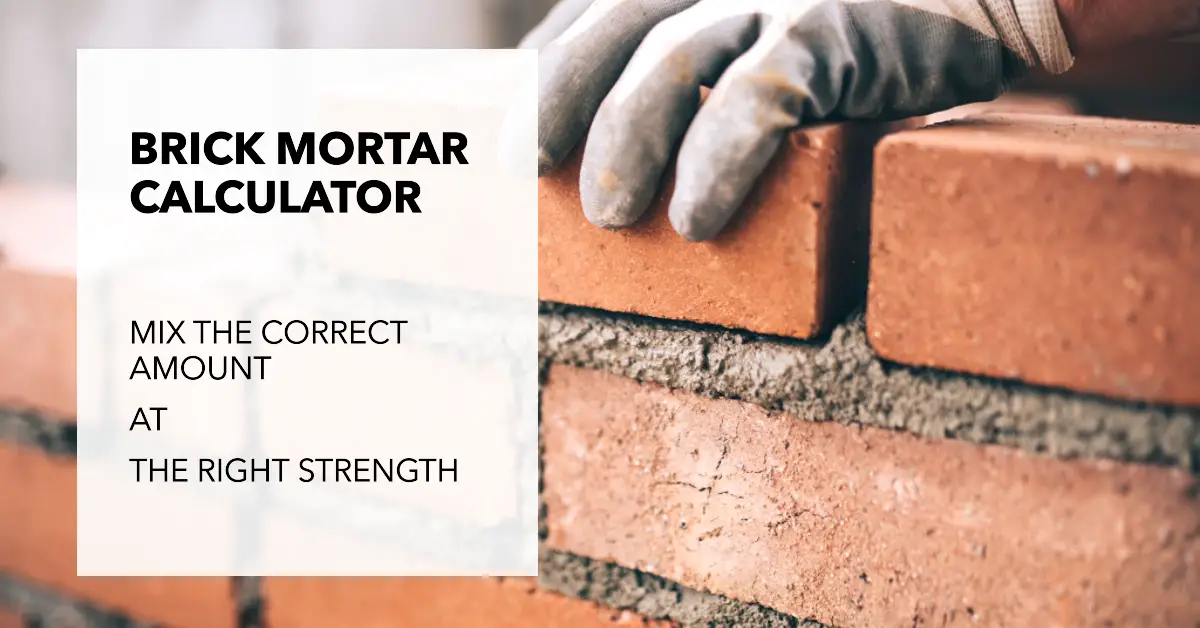Are you embarking on a bricklaying project and need an accurate estimate of the number of bricks required?
Our Brick Mortar Calculator is here to simplify the process and provide you with precise calculations.
Whether you’re a DIY enthusiast or a professional builder, this handy tool will save you time, effort, and ensure you have just the right amount of materials for your project.
Brick Mortar Calculator
Are you tired of manual calculations and uncertain estimates when it comes to brick mortar quantities?
Our Brick Mortar Calculator is designed to take the guesswork out of the equation.
With just a few simple inputs, you can determine the exact number of bricks needed for your wall or structure.
Brick Mortar Calculator
Let’s take a closer look at how it works:
How To Use The Brick and Mortar Calculator
- Input the Brick Size: Start by entering the size of the bricks you’re using. Measure the length and height of a single brick and input the values in square meters. This ensures accurate calculations tailored to your specific brick dimensions.
- Bricks per Square Meter: Next, provide the number of bricks per square meter. This value varies depending on the size and type of bricks, as well as the mortar joint thickness. Consult your supplier or refer to industry standards for the recommended value.
- Wall Length and Height: Enter the dimensions of your wall, including the length and height in meters. These measurements allow the calculator to determine the total wall area accurately.
- Click Calculate: Once you’ve entered all the necessary information, click the “Calculate” button. The calculator will instantly provide you with the total number of bricks required for your project.
Why Use Our Calculator Brick Mortar Calculator?
- Accuracy: Say goodbye to overestimating or underestimating brick quantities. Our calculator ensures precise calculations based on your specific inputs, minimizing wastage and reducing the need for additional orders or returns.
- Time and Effort Savings: No more manual calculations or complex formulas. Our calculator automates the process, saving you time and effort that can be better spent on other aspects of your project.
- Cost Efficiency: By knowing the exact number of bricks needed, you can optimize your material purchases, avoiding excess expenses or shortages. This helps you stay within budget and maximize cost efficiency.
FAQ’s
How much mortar per m2 of brick?
The amount of mortar required per square meter of brickwork depends on factors such as the size of the bricks, the thickness of the mortar joints, and the bond pattern being used. Typically, mortar quantities range from 15 to 20 kg per square meter of brickwork.
How do you calculate mortar for brickwork?
To calculate the amount of mortar needed for brickwork, you need to consider the number of bricks, the dimensions of the bricks, the thickness of the mortar joints, and the area of the wall. The mortar quantity can be estimated by multiplying the total wall area (in square meters) by the mortar thickness (in meters). It is advisable to consult with a professional or refer to mortar mixing guidelines for accurate calculations.
How many cubic meters of mortar do I need to lay 1000 bricks?
The amount of mortar required to lay 1000 bricks depends on the brick size, mortar joint thickness, and the type of bond used. On average, it may require around 0.4 to 0.5 cubic meters of mortar (or 400 to 500 liters) to lay 1000 bricks with standard mortar joints.
How many bricks in 1 square meter with mortar?
The number of bricks in one square meter with mortar depends on the size of the bricks and the thickness of the mortar joints. For standard UK-sized bricks (215mm x 102.5mm) with a mortar joint thickness of 10mm, you can expect around 55 to 60 bricks per square meter.
How do I calculate how much mortar I need?
To calculate the amount of mortar needed, you need to determine the total wall area, the brick size, and the mortar joint thickness. Multiply the wall area by the mortar joint thickness to get the volume of mortar required. You can then convert the volume to the desired unit (such as liters or kilograms) based on the consistency and density of the mortar.
How much mortar per 1000 bricks UK?
The amount of mortar required per 1000 bricks in the UK depends on the size of the bricks and the thickness of the mortar joints. On average, it may require around 500 to 600 kilograms (0.5 to 0.6 cubic meters) of mortar to lay 1000 standard-sized bricks with standard mortar joints.
How do I account for different bond patterns or wall thickness in the calculations?
This calculator assumes a standard bond pattern and wall thickness. If you are using a different bond pattern or have a non-standard wall thickness, consult with your contractor or supplier for specific calculations.
Can I use this calculator for other masonry materials, such as concrete blocks?
This calculator is primarily designed for calculating the number of bricks. If you are working with other masonry materials like concrete blocks, you will need to use a separate calculator that takes into account the dimensions and characteristics of those materials.
What are some common brick sizes used in the UK?
Common brick sizes in the UK include standard bricks (215mm x 102.5mm x 65mm), metric bricks (215mm x 102.5mm x 75mm), and non-standard sizes. It’s important to check the specific brick size you are using and adjust the inputs accordingly.
Conclusion
Don’t let brick mortar calculations cause unnecessary stress or uncertainty. Our Brick Mortar Calculator is a reliable tool that simplifies the process and provides accurate estimates tailored to your project. Whether you’re building a small wall or undertaking a larger construction endeavor, our calculator ensures you have the right quantity of bricks at your fingertips. Give it a try today and experience the convenience and efficiency it brings to your bricklaying projects!
Author Profile

- I have many qualifications and certificates in construction, such as City & Guilds, CPCS and CITB. These are the highest standards of training and competence in the industry. Whether you need help with plumbing, carpentry, bricklaying or any other trade, I’m here to help you succeed.
Latest entries
- March 6, 2024CalculatorsWall Tile Calculator: How Many Wall Tiles Do You Need
- February 29, 2024Roof Truss Cost Calculator
- December 31, 2023Wage Take Home Calculator
- December 30, 2023Day Rate Calculator

